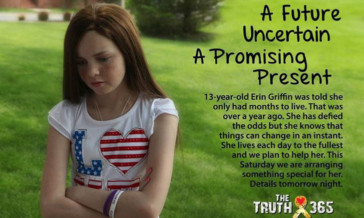
Stricken Scots teen addresses thousands at US rally.
Amanda Griffin calls her daughter a wee superstar. It’s little wonder. Teenager Erin is quickly becoming the international face of childhood cancer awareness.
The 13-year-old, originally from Kilmarnock, has recently returned from the States where she addressed thousands at a rally close to the White House. She’s also a familiar name in her adopted home of Australia, featuring in numerous articles and TV reports. And she’s doing it all while fighting an aggressive cancer that doctors predicted would have killed her at least six months ago.
Erin spent a year keeping her illness an inoperable brain tumour called Diffuse Intrinsic Pontine Glioma (DIPG) a secret from everyone except her family and best friend. But in February, after seeing other kids die from the disease, she decided she didn’t want to hide. Erin wanted to make a difference.
Amanda explained: “She was frightened people would treat her differently. Every time she had radiation treatment, she’d go to school in the afternoon and make an excuse to classmates about where she’d been.
“Erin’s a shy girl. Her personality doesn’t fit with what she’s doing but she just wants to make a difference. She could easily have sat back and just taken the treatment, but she wants to raise awareness. Erin cares about other people.”
The youngster works with charities in Australia and America and has helped raise $50,000 for an organisation funding research into DIPG. She’s also the only child taking part in a ground-breaking trial which, if successful, could change the way cancer is treated.
For a week every month, Erin flies to Sydney to participate in the MGMT Gene Therapy Trial. Previously only tested on dogs and baboons, her bone marrow cells are genetically modified to protect her from high doses of chemotherapy.
“A lot of parents won’t put their kids through it, but Erin was old enough to understand. She said she wasn’t going to just do nothing and die.”
So far the results have been positive. Recent MRI scans showed the tumour had shrunk by 15%.
“Doctors in oncology believe it will open doors, including in adult cancers,” Amanda said.
It was a different story in February 2012, when Erin was diagnosed. By June, doctors were preparing Amanda, husband Ian and Erin’s brother, Declan, for the worst.
“Brain stem tumours are hard to treat,” continued social worker Amanda. “They’re diffused, which means they grow between healthy brain tissue and are inoperable. We were told she only had a matter of months six to nine.
“Brain cancer is the biggest killer of kids in developed countries yet receives little funding.
“I’m in this for life, but my plan is that Erin beats this and gets better. She’s a wee superstar and she will make a difference.”

Enjoy the convenience of having The Sunday Post delivered as a digital ePaper straight to your smartphone, tablet or computer.
Subscribe for only £5.49 a month and enjoy all the benefits of the printed paper as a digital replica.
Subscribe